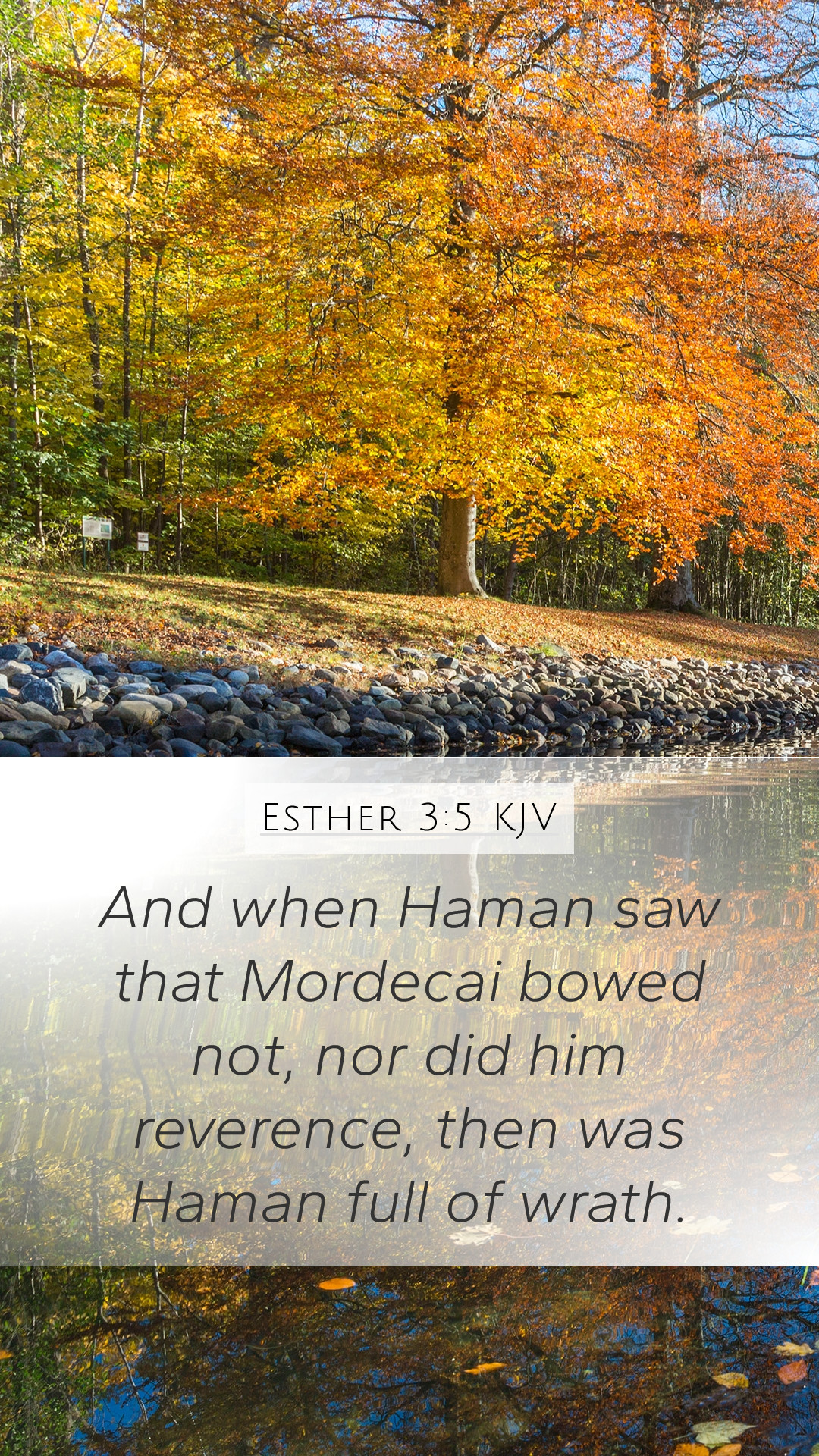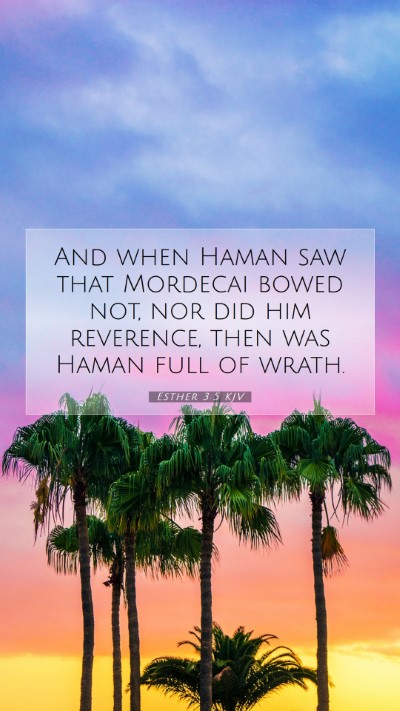Old Testament
Genesis Exodus Leviticus Numbers Deuteronomy Joshua Judges Ruth 1 Samuel 2 Samuel 1 Kings 2 Kings 1 Chronicles 2 Chronicles Ezra Nehemiah Esther Job Psalms Proverbs Ecclesiastes Song of Solomon Isaiah Jeremiah Lamentations Ezekiel Daniel Hosea Joel Amos Obadiah Jonah Micah Nahum Habakkuk Zephaniah Haggai Zechariah MalachiEsther 3:5 Meaning
What is the meaning of Esther 3:5?
And when Haman saw that Mordecai bowed not, nor did him reverence, then was Haman full of wrath.
Esther 3:5 Bible Verse Meaning
Understanding Esther 3:5
Esther 3:5 states: "And when Haman saw that Mordecai did not bow or pay homage, Haman was filled with wrath." This verse marks a pivotal moment in the biblical narrative, reflecting the intense animosity Haman felt toward Mordecai, which would set the stage for the events of the Book of Esther.
Bible Verse Meaning
The meaning of this Bible verse can be unpacked through the insights of several public domain commentaries:
-
Matthew Henry:
Henry illustrates that Haman's anger arises from pride and intolerance, as he expected everyone to show him respect. Mordecai’s refusal to bow was not only an act of defiance but also a statement of faith and allegiance to God alone.
-
Albert Barnes:
Barnes emphasizes the historical context, portraying Haman as a symbol of arrogance and tyrannical power. Haman’s wrath represents the hatred that often cultivates in the hearts of those who feel disrespected or disregarded by others.
-
Adam Clarke:
Clarke notes the significant moral lesson derived from this confrontation. He mentions that Mordecai's courageous stand against bowing down to Haman was an example of unwavering faith in God, reflecting the priority of spiritual loyalty over societal pressures.
Bible Verse Interpretation
In interpreting Esther 3:5, we can recognize several important themes:
-
The Dangers of Pride:
Pride leads individuals like Haman to seek power and retribution against those who oppose them. This verse illustrates the destructive nature of pride when it is left unchecked.
-
Faithfulness in Adversity:
Mordecai exemplifies the faithful believer who stands firm against cultural expectations, prioritizing loyalty to God above all else.
-
The Ripple Effect of Actions:
Haman’s wrath sets off a series of events that will affect the entire Jewish population. This speaks to how one individual’s choices can have far-reaching consequences.
Bible Study Insights
This segment of Scripture encourages believers to engage in deep Bible study insights. Consider the following questions during your Bible study groups:
- What does Mordecai's refusal to bow teach us about loyalty to our beliefs and values?
- How can we identify and confront pride in our own lives, similar to Haman’s?
- What historical contexts can deepen our understanding of Scripture in this narrative?
Application of Esther 3:5
The verse encourages us to apply these insights in various circumstances:
-
Application in Daily Life:
Believers are challenged to stand firm in their faith, much like Mordecai, especially when pressured by societal norms.
-
Conflict and Wrath:
Understanding that personal conflicts, like that of Haman and Mordecai, can be reflective of larger spiritual battles we face.
Cross References
This verse connects deeply with other Scripture passages, enhancing our overall understanding:
- Exodus 20:5: A reminder of the commandments regarding worship and idolatry.
- Proverbs 16:18: "Pride goes before destruction, and a haughty spirit before a fall."
- Psalm 73:3: Explores the envy of the arrogant and the consequences of their pride.
Conclusion
Esther 3:5 serves as a crucial verse that encapsulates themes of pride, faithfulness, and the intricate dynamics of human conflict. Through studying this verse in-depth, you gain valuable Bible verse explanations that highlight both moral lessons and significant insights for personal application.


